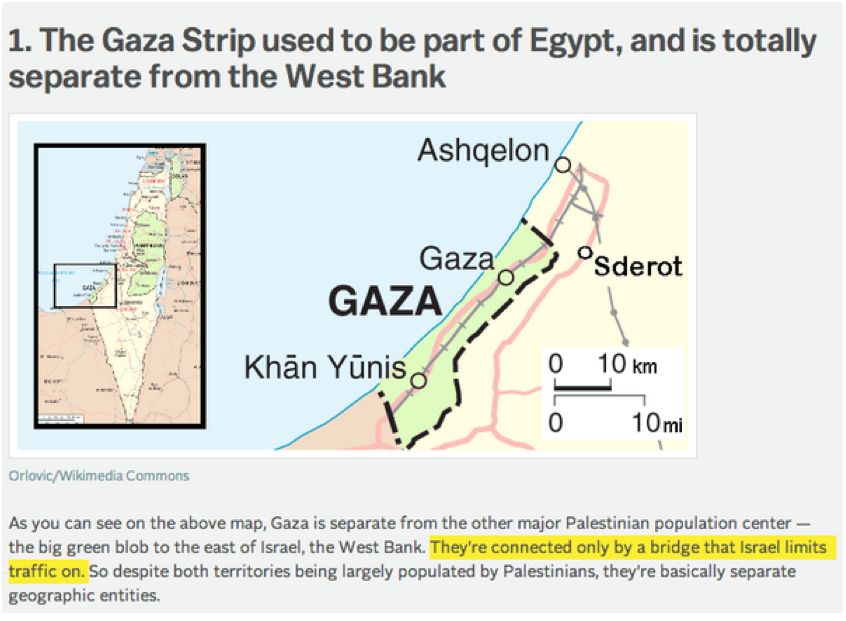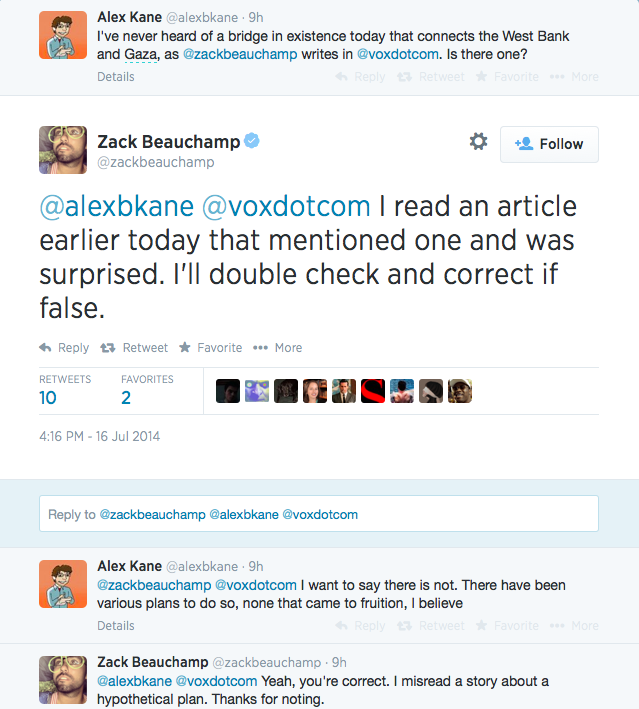By An Old Friend
Thu, Jun 3, 2021 4:49 p.m.AOF: Peak doofus of journalism? It may have materialized in 2014, in the person of vox's Zack Beauchamp.
In a vox "explainer" [!!!!] article about the then-current Israel/Gaza festivities, he wrote that there's a bridge connecting Gaza with the Palestinian area in the West Bank. See the article by Mollie Hemingway below.+
(In saying "peak doofus," I don't mean to imply that the stupidity level has dropped significantly since then.)
Note that Zack-the-doofus is, himself, Jewish:
[N.S.: I vaguely recall some other notorious incident involving this Zack Beauchamp mook. I'll have to look it up.]
Here's Hemingway's article:
vox' Motto Should Be "Explaining The News Incorrectly, Repeatedly"
I recently published an article about how "Media Ignorance Is Becoming A Serious Problem." My better half wrote this week on "The Death of Explanatory Journalism."
It was impossible for either of us to ignore, in our discussions of journalists' arrogance in spite of ignorance, the problems erupting out of vox.com, a site that claims to explain the news.
But even for vox, what happened yesterday in Zack Beauchamp's "11 crucial facts to understand the Israel-Gaza crisis" was pretty voxy.
vox has corrected a portion of what it got wrong on the first crucial fact in its listing, but here's a screencap:
The relevant portion is:
As you can see on the above map, Gaza is separate from the other major Palestinian population center -- the big green blob to the east of Israel, the West Bank. They're connected only by a bridge that Israel limits traffic on.
Yes. This happened. A journalist who has a paying job as a "news explainer" wrote that Israel limits traffic on a bridge that — as anyone with even the slightest bit of knowledge about Israel knows — does not exist.
It's been a bad few weeks months for vox, as these problems with facts have plagued the site since its launch. That's not good when your whole business model is "explaining the news."
How could anyone cover this issue, much less presume to explain it in pieces headlined "Everything You Need to Know about Israel-Palestine," and believe that this bridge exists?
All journalists make mistakes because all journalists are human. And few of us can be experts in even a single area, much less the many we're required to cover in a given month. But this isn't about getting a name wrong or not knowing about some arcane detail.
In order to write what Zack Beauchamp wrote, you would have to be completely unfamiliar with the area. I mean, I've only been to Israel once, and spent most of my time in Jerusalem, Tel Aviv and the area around the Sea of Galilee but I have driven in the West Bank and close to Gaza. It's not just about not knowing the geography of the area about which you claim to be expert enough to explain it to others. It's also about not knowing even the first thing about the daily lives of those in Gaza and the West Bank as well as those in Sderot and other cities regularly shelled by rockets coming out of Gaza.
In order to "(mis)explain the news" in the way vox did yesterday, you'd have to be unfamiliar with all the talks about joining the West Bank and Gaza in the case of a future Palestinian state. It's safe to say you wouldn't be knowledgeable on anything about the conflicts between the groups that control the West Bank and Gaza. And it might say something about one's research skills that such an error would make it into the first "crucial" fact about the conflict. See this exchange:
Someone who could "misread" "an article earlier today" about a hypothetical plan and be "surprised" by its contents — and yet include this erroneous surprise tidbit as a crucial fact — is not doing journalism.
There may, in fact, be a need for vox's "news for dummies" model of so-called explanatory journalism but many of the folks there are simply not up to the task. These errors are routine, embarrassing and, perhaps as a result of that, not handled with clear corrections. While this bridge error was corrected, for instance, the claim that Israel had restricted traffic on it was not mentioned in that correction.
vox has struggled with imparting correct information on everything from baptism to immigration, but Israel seems to be an area the vox-crew finds particularly challenging. My colleague David Harsanyi has discussed problems with two recent pieces by Max Fisher (here and here) while David Bernstein writes over at the washington post that "vox.com refuses to correct Max Fisher's error re Hebron." And here's a fact check on just the first of those two dozen cards on Israel that suggests major problems. It would be one thing if vox could hide the distribution of bad information, as Jon Stewart attempts to, behind claims of satire.
And I'm sorry, but this Beauchamp error is so unbelievably bad that I almost have a hard time believing it. vox claims it has "the smartest thinkers asking the toughest questions." Beauchamp wrote vox's 26-card "explainer" on Israel and Palestine and he thought — until a random internet person corrected him — that there was a bridge connecting Gaza to the West Bank. I repeat: He thought that there was a bridge connecting Gaza to the West Bank.
I mean, I almost think the most logical explanation is that this was a Mossad operation to forever discredit everything vox ever writes on Israel for all time. Effective, if so.
Mollie Ziegler Hemingway is a senior editor at The Federalist. She is Senior Journalism Fellow at Hillsdale College and a Fox News contributor. She is the co-author of Justice on Trial: The Kavanaugh Confirmation and the Future of the Supreme Court.


jerry pdx
ReplyDeleteMy guess is that if you challenged Beauchamp on this he's say something like: I meant to write highway, not bridge, it was just an error. Maybe...but not knowing rudimentary facts is so common with these Woke fools I wouldn't be surprised at anything.